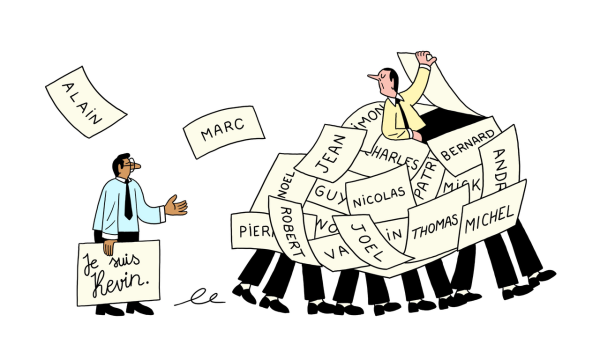
In June, France’s recently elected Assemblée Nationale opened its new term with five hundred and seventy-seven legislators, among them two Kevins. They are Kévins, actually, with an acute accent, though in France the name is spelled in several variations, including Keven, Kevyn, Keveen, and plain old Kevin with no diacritic. Both men belong to the Rassemblement National, Marine Le Pen’s far-right party. Kévin Pfeffer, born in 1990, was elected by the Moselle, a department in the country’s northeast corner. Kévin Mauvieux, born in 1991, hails from the Eure, between Paris and Le Havre. Their mere presence, in a chamber full of Philippes (fifteen), Nicolases (ten), and Annes (ten, if you count Anne-Cécile, Anne-Sophie, Anne-Laurence, and two Anne-Laures), provoked fascination. “The first two deputies named Kévin enter the National Assembly,” Le Républicain Lorrain announced. “Will the Kévins finally have their revenge?” Le Point asked.
An observer in America (where there are three Kevins in the House and one in the Senate, all Republicans) or, say, Australia (where a Kevin was Prime Minister) might be forgiven for wondering what all the fuss was about. Why are there Kevin memes and Kevin skits and Kevin jokes and even a Kevin novel, from 2015, in which a character named Kevin says that he “doesn’t have the right to be an intellectual” and poses as an Alexandre? Why did the French go around talking about “the curse of the Kevins” and saying things like “You can be a Kevin and succeed in life”?
That last quote comes from Kévin Fafournoux, a thirty-five-year-old motion designer and filmmaker in Paris, who, on June 3rd, the feast day of Saint Kevin, launched a campaign to fund a documentary, “Sauvons les Kevin” (“Save the Kevins”). The Kevins need saving, basically, from snobbery and even social discrimination. Their name was once extremely popular in France but has come to suffer a bad reputation, conjuring, for its detractors, as Fafournoux once explained, “car-tuning fans, reality TV, tracksuits—clichés of the beauf, preconceptions that hurt. (Beauf, short for beau-frère, or “brother-in-law,” signifies “an uncultivated, vulgar, narrow-minded and phallocratic man,” according to one leading dictionary, and is a whole pejorative universe in itself.) Like to-go coffee or athleisure, Kevin strikes certain French people as a gauche Anglo-Saxon import. During this year’s Presidential election, the extreme-right candidate Éric Zemmour condemned the name as “a symptom of de-France-ization and Americanization.” Fafournoux told me, “The idea is to think about how to deconstruct these stereotypes, and also to give voice to Kevins, because I’m not the only one.”
The name Kevin comes from Ireland. The anglicized form of Caoimhín, it is said to mean “handsome birth.” According to Behindthename.com, it became popular in English-speaking countries outside of Ireland before spreading across Europe in the second half of the twentieth century. There are Kevins in the works of James Joyce and Octavia Butler, and a Kevin among the Power Rangers. There are entertainer Kevins (Bacon, Jonas, Hart), basketball Kevins (McHale, Durant, Garnett), and Kevins we haven’t heard much from recently (Richardson, Federline). In America, Kevin was one of the top twenty names for boys every year between 1957 and 1979. It now ranks a hundred and eighty-second, between Brandon and Judah. “The reason I enjoy the name is because it is neither popular nor unpopular,” my first cousin Kevin Pearson told me.
In France, the name caught on later. In 1952, only four newborns in the entire country were given the name; they were the first French Kevins on record, according to data collected since the year 1900. Usage fluctuated until the nineteen-seventies, and then soared. From 1989 to 1994, Kevin was France’s most popular name for boys, peaking in 1991, with 14,109 births. (A dozen or so children each year, mostly girls, were called Kevine.) The name’s sudden success is widely thought to have been inspired by American movies, such as “Dances with Wolves,” starring Kevin Costner, and “Home Alone,” featuring Macaulay Culkin as Kevin McCallister.
Baptiste Coulmont, a sociologist at the École Normale Supérieure Paris-Saclay, has argued that Kevin “embodies the cultural emancipation of the popular classes.” Traditionally, the bourgeoisie dictated the fashions for names, which then percolated down the social scale to the middle and working classes. By looking out, rather than up, for inspiration, the parents of Kevins—along with Brandons, Ryans, Jordans, and other pop-culture-inspired names that took off in France in the nineteen-nineties—asserted the legitimacy of their tastes and their unwillingness to continue taking cues from their supposed superiors. I asked Coulmont if he could think of any other first name that provoked such strong feelings. “The name Mohamed, perhaps,” he replied. “But Kevin triggers reactions from people who reject the cultural autonomy of the popular classes, while Mohamed triggers the reactions of xenophobes.”
After announcing his crowdfunding drive, Kévin Fafournoux received some three hundred messages from Kevins around the country, testifying to their ordeals. Some told of being shunned after introducing themselves at bars, or zapped on dating apps as soon as their names popped up. One Kevin, a psychologist, said that he had agonized about whether to put his full name on the plaque outside his office building. “We find people who have a sense of malaise and who have real problems,” Fafournoux said. Coulmont found that students named Kevin perform proportionally worse on the baccalaureate exam, not because of a stigma surrounding the name but because Kevins tend to be, as he put it, of a “lower social origin.” In 2015, the director of the Observatory of Discriminations, a watchdog group, claimed that a candidate named Kevin had a ten to thirty per cent lower chance of being hired for a job than a competitor named Arthur. Kevins also have a hard time in such countries as Germany, where the practice of name discrimination is referred to as “Kevinismus,” and an app that purports to help parents avoid it is called the Kevinometer.
A headline in Le Gorafi, the French equivalent of the Onion, once mocked “The Passing of the Oldest Kevin at Thirty-two Years Old.” But the Kevins, aging into action and perhaps a form of solidarity, are not content to surrender to social contempt. Kévin Fafournoux envisions his film—“a documentary about Kevins, with Kevins, directed by a Kevin”—as a means to help “reverse the trend and put Kevins back in fashion.” He asked for eight thousand euros, to fund production costs, including trips to Ireland and Germany. So far, he’s doubled his goal. “Kévin power ;),” one donor, a nurse, wrote, explaining that he was no longer embarrassed by his name, even embroidered on his lab coat. Another added, “For my ex, who apologizes every time he introduces himself!” Fafournoux told me, “I think we will manage to change the story and to take back our name.” ♦
Sourse: newyorker.com






